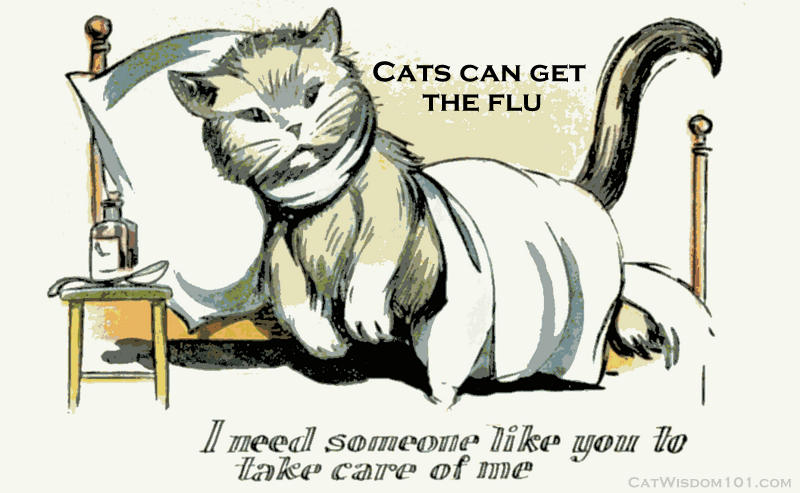
Vet 101: Cats Can Get The Flu Too

The answer surprises most people: Yes, cats do get influenza virus, and they appear to be susceptible to most if not all strains of influenza A (1). That cats are susceptible to the virus is a relatively recent discovery, so not all veterinarians are aware of this fact or that human beings can transmit the flu to cats.
I have seen cats with the flu and even got a call last Thanksgiving from a couple who had a feverish cat. I asked whether anyone had recently been sick in their household and … both people in the household were recovering from influenza A. The cat recovered without incident and with no lasting harm, but my clients had no idea they could give the flu to their cat.
That leads to three major questions. What is influenza A, what are the symptoms, and how do you keep your cat from getting it?
Let’s start with the basics of influenza. (If you’re not interested in the details of how influenza viruses are classified and just want the facts that are relevant to survival, feel free to skip the next paragraph.)
Influenza viruses are classified as A, B or C. We don’t worry about B and C much, because they are relatively uncommon and they infect only a limited number of species (B infects only human beings and seals and, like C, is usually milder than A and does not cause epidemics). Unfortunately, even though we have only one genera of influenza virus to worry about, the story isn’t as simple as that might imply. You’ve probably heard some combination of numbers, H’s and N’s mentioned in news stories about influenza; for example, H1N1, H5N1. These are subtypes that describe structures on the surface, or capsule, of the virus and that are involved in immunity to the subtypes. These surface molecules change frequently by mutation of the virus, which complicates the body’s ability to recognize the virus and mount an immune response that would block infection. Frequent mutation also results in the development of new subtypes. (If you’ve made it this far and feel a compulsion to learn even more about influenza viruses, this link is for you:http://en.wikipedia.org/wiki/Orthomyxoviridae.)
Ok, back to you and your cat. Influenza A is what we talk about when we talk about flu season in the USA. All of those H’s and N’s you hear about in the media are subtypes of Influenza A. Some subtypes tend to be around all of the time at low levels, but others are much more prevalent when the outdoor temperatures are low, which explains why “flu season” typically arrives in late fall and runs through early spring. Which influenza A subtypes can your cat get? By and large, most any of them. Some are more contagious than others, but pretty much any of them can be transmitted.
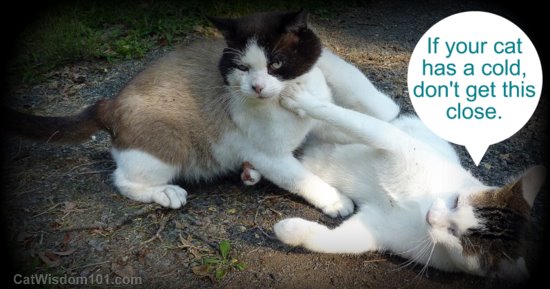
How does your cat get the flu? She gets it from you or your visitors in most cases!
The media likes to talk endlessly about what you can get from your cat, and veterinarians do have an important role in combating such zoonotic diseases, but in my day-to-day practice I see many more cats with infections that likely came from human beings than I see cats with infections that pose a risk to human beings. Most of us, after all, have cats that are confined to a home and whose only contact with the outside world is people. Cats that go outside can get the virus from other animals, however. One example is by eating infected birds.
Influenza is a respiratory infection; it causes fever, sore throat, upper and lower respiratory inflammation, and, in some cases, pneumonia.
Cats and human beings have pretty much the same symptoms. The illness starts with a runny nose, fever and sneezing/coughing and can progress to complete respiratory misery. In human beings, the death rate with some strains is high. An estimated 36,000 people die each year in the United States from influenza viral infections, despite the availability of antiviral medications. The mortality rate in cats is unknown, but fatal cases have been documented. The use of anti-influenza drugs in cats is uncommon and still experimental. Most of the reported influenza deaths in cats have been in middle-age cats (8 to 10 years old).
The flu virus is most contagious when fever is present, and during contagious periods the virus is easily transmitted through contact with respiratory fluids. Most cats probably get the flu from an infected family member during the contagious period as they snuggle with the sick person, trying to comfort them. Most cats like to get in people’s faces, and who can resist a cat that wants to be petted?
Protecting your cat is simple. The first thing to do is to get your flu vaccine every year. Vaccination significantly reduces the chance that you will get the virus in any given year. Because the subtypes change rapidly, vaccination on a yearly basis is needed. Influenza vaccines are not available for cats.
The next thing to do is also the hardest: don’t snuggle with your cat when you have a fever! I know, I know: this is nearly impossible even when you’re feeling well, so don’t feel too bad if you can’t resist the temptation of some kitty snuggles. But try not to let them get in your face when you are sick, and keep those soiled tissues out of the reach of your cat. Before petting your cat, disinfect your hands just as you would if you were going to shake hands with another person.
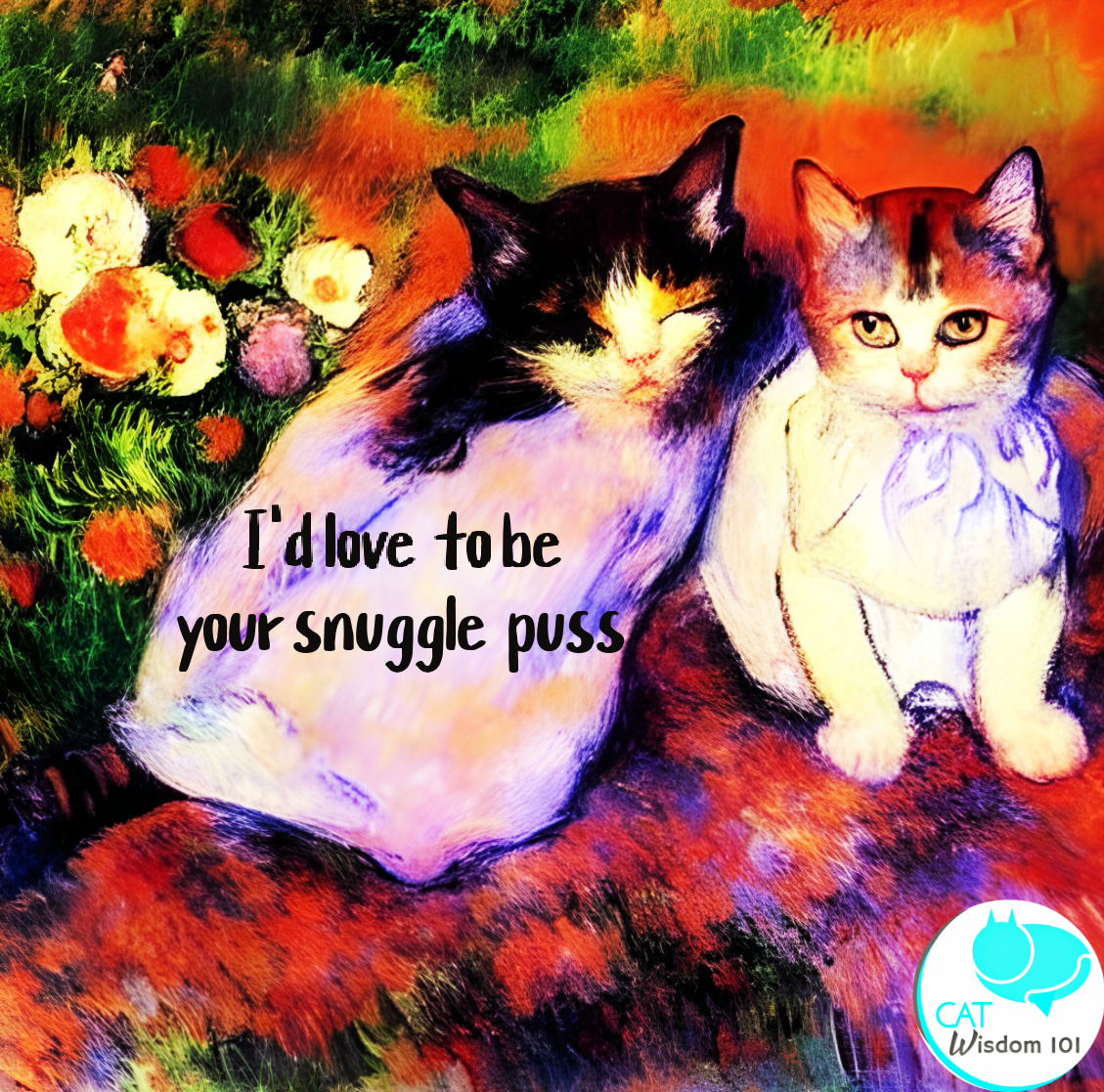
If you have a cat that is in poor health, be especially careful not to expose them to the virus.
- Already weak cats are the most likely to need hospitalization or to die from infection.
- Cats with respiratory infections can feel so miserable that they won’t eat or drink, and so they get dehydrated. If this happens, they will need to be hospitalized for IV fluids, and some will need supplemental oxygen.
- If severe enough and if the diagnosis is clear, anti-influenza drugs may be helpful, but little is known about using them in cats. The drugs appear to be safe, but to my knowledge no large controlled studies have been conducted on their use in cats.
- If you have a cat with feline immunodeficiency virus (FIV) or a chronic disease such as diabetes mellitus that affects the immune system, guarding against the flu is doubly important, as these cats are more likely to have severe disease if they get infected. Elderly cats are also less able to fight infection, so be sure to protect them as well.
Please don’t be offended or surprised if your veterinarian hospitalizes your cat in an isolation ward. Cats with influenza could be contagious, so extra precautions are needed to protect people and other pets from infection.
- The best ways to keep your cat from getting the flu are to protect yourself from infection and to make sure your cat is in the best health possible.
- If your cat does get the virus, keep them hydrated and warm and seek your veterinarian’s help if your cat is not eating and drinking.
- If they appear to be very sick, early treatment with antiviral medications can theoretically be helpful.
- Be proactive in letting your veterinarian know that your cat may have influenza. This will let the veterinarian know that the cat could be contagious to people and other animals, and it might affect which treatments she uses. If all goes well, your cat and you will recover quickly and be ready to fight next year’s strain of the flu.

Given its remarkable adaptability, the influenza virus is always going to be present in our world (although a universal influenza vaccine might be on the horizon: http://www.fda.gov/BiologicsBloodVaccines/ScienceResearch/ucm353397.htm), and our cats are threatened by it, just as we are (for more information, including flu activity in your area, as well as other epidemiological data, see https://flunearyou.org/?nan_pid=1817297488).
(1) A Ali; J B Daniels; Y Zhang; A Rodriguez-Palacios; K Hayes-Ozello; L Mathes; C W Lee. Pandemic and seasonal human influenza virus infections in domestic cats: prevalence, association with respiratory disease, and seasonality patterns. J Clin Microbiol. December 2011;49(12):4101
Dr. Letrisa Miller has a feline focused practice in Manchester, Conn.
We’d like to know: Has your cat ever had the flu?
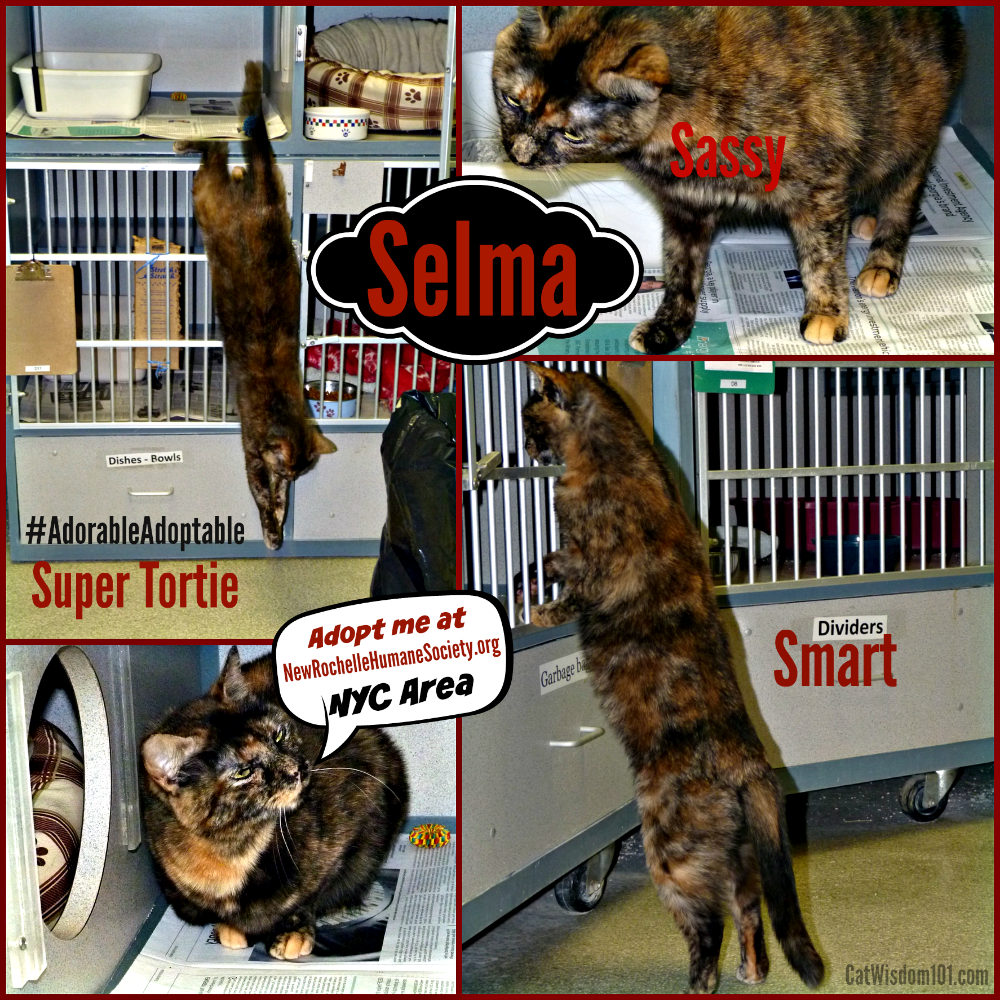

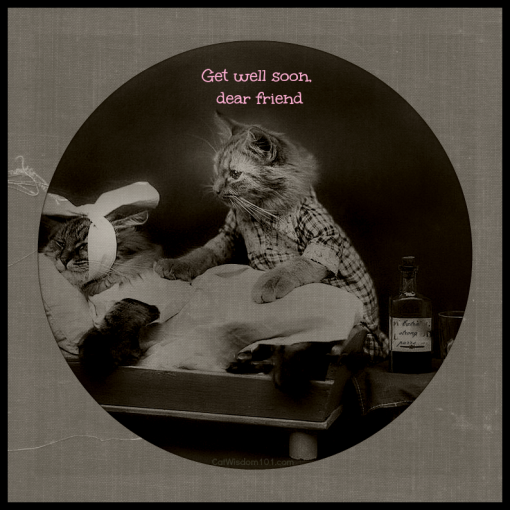
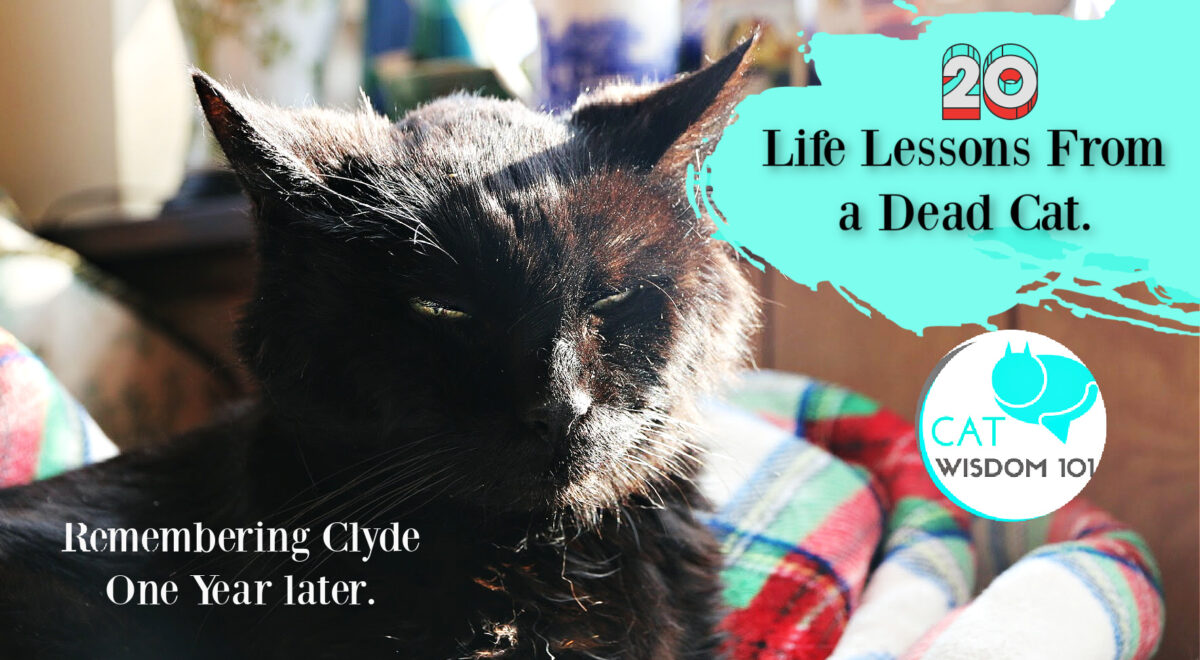
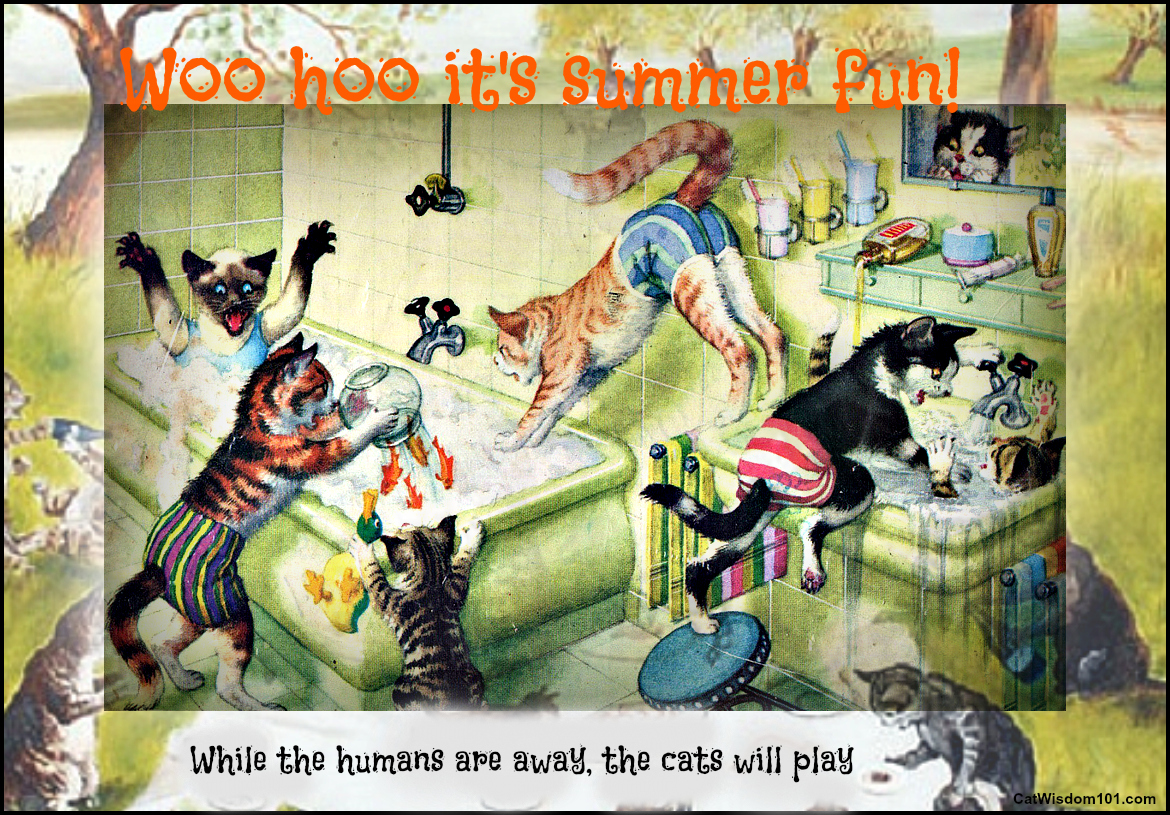

40 Comments
Stacy
Excellent article, I like to read a lot of articles on one topic to get a big picture. Guys, who needs it, here is a clear table comparing the symptoms of colds and flu in the table:
I understand perfectly well when a problem concerns you personally. You have to search a lot of content before going to the vet for sure.
WendyApplebee and Grayson
Please explain how in a few hours at the vets and being deserted , can a cat return home so sick and the vets not realise it. I’m stumped .i believe he returned home with a bad infection. to the point I thought he would die and the vets wanted me to wait 4 days to see him as it was over Easter weekend. He has improved somewhat but the symptoms are there and his voice box is a squeak
WendyApplebee and Grayson
My male cat went to vets very healthy. He was deserted. On returning home he was unite sick .hach
King cough, sneezing and virtually no voice .a couple days late the vets gave me antibiotics .he is still on them. His meow is so only just audible the cough and sneezing are still there. The vets say it must be the flu. He was close to dying. The vets take no blame
Paige kislea
This goes the same for opossums, my pet opossum has just gotten sick from me and my boyfriend who got sick. I’m sure the medical research on this species and influenza probably isn’t much so I guess I’ll just have to keep an eye out for real problematic symptom. As of right now she is sneezing and has boogies. She is extremely old and just went through surgery a month ago so my hopes are in the antibiotics she’s been taking for her healing wounds.
Wolfos
I got the flu shot and got sick afterwards. My cat was snuggling with me all day and I noticed she wasn’t really eating her food so, I wanted to check to make sure. Great info! Thanks!! ^-^
Sheryl Robinson
Oh my I never knew! What are the 1st symptoms to look for? I’m so glad I found this site. Best of luck to all our babies and their care takers!
tara white
I’m super worried because my boyfriend developed the flu a week ago and I got it wednesday( on top of my chronic bronchitis). My indoor cat was snuggling with me the entire time and I was coughing like crazy. She has been acting a bit off all day. I wish the medical community would let people know it’s possible to transmit the flu to your pets! I had no idea. I never would have let her in my room and would have worn a mask at the very least. Is there anything I can do now that I know she has been exposed?
Layla Morgan Wilde
Sorry you have the flu. The incubation time is 1 to 4 days and you’re already past that so odds are your cat will be fine.
tara white
I hope so thank you
Cindi Miller
My husband and I are owned by two indoor only cats. Both have had all shots, they are seniors, both are neutered. Over the years I have noticed that every time I get a cold or flu or my husband does, the cats catch it about a week later. They sneeze, cough, have runny noses and eyes, and run a fever. They have no contact with other living things…just us. I was always told this was not possible, but I have seen otherwise. Do cats get colds and flu??? YES THEY DO!!! Done the math.
Kathy
I’m in the middle of a cat crisis. I went to the doctors last week and was told I had a virus. Now all six of my cats are sick. WTH???? Had I known they could catch this i would have never exposed them to it. They are all drooling and mouth breathing and im scared they are not going to make it. Right now it’s all clear fluid coming out but what am I to do if that changes. I keep them inside for just this reason. So they don’t get exposed to anything.
david
You should have taken them to the vet and put them on antibiotics. I hope all weathered the storm.
Edie
I had not had the flu in at least 15 years until last winter. I then passed it to my husband and Poo Poo Kitty. I didn’t realize I could be contagious to my cat either. He continued to drink water on a regular basis but the only thing I could get him to eat was Delectables Bisque soup like snacks. He was very lethargic for 2 weeks. I also had to change his dry food when he recovered because he wouldn’t go back to it. At that point I was willing to give him anything he would eat. Hope this is helpful.
WendyApplebee and Grayson
My male cat went to vets very healthy. He was deserted. On returning home he was unite sick .hach
King cough, sneezing and virtually no voice .a couple days late the vets gave me antibiotics .he is still on them. His meow is so only just audible the cough and sneezing are still there. The vets say it must be the flu. He was close to dying. The vets take no blame
No one at home has had the flu .Grayson is ten months old
Lily
Thanks you for this great information. It is going right into my “Kitty Health” folder for reference.
Lily
Kjelle Bus aka Charlie Rascal
Had NO idea about this !
But I´m not so worried because my humans is followimg all the “good practices” like washing their hands and using hand sanitizer 🙂
XOXO
meowmeowmans
Wow, we did not know this. The humans get flu shots every year, and follow all the “good practices” like washing their hands. So hopefully none of us gets the flu!
Hugs!
The Swiss Cats
Wow, we didn’t know that ! Fortunately, our humans never got flu, but we’ll be more careful next time they are sick ! Purrs
Bev Green
A great article..indeed catflu can be super nasty for kitties..Dinnermintz had been in an isolation ward at our shelter and it was rampant in there,even with the strict hygiene steps in place..so all us foster mums had to take sick kitties home to try and stop it going around in circles..antibiotics and on the 3rd time we had her back with us (very persistent strain) well she became a foster fail! we found rescue remedy and natural herbal sprinkles on the food kept most flus at bay..stress also being a common cause for catflu. Hope you are feeling better Layla hugs and loves Fozziemum xx
Layla Morgan Wilde
Thanks so much for sharing your personal experience. What herbal sprinkles?
Ellen Pilch
I had no idea cats could get the flu from us, I am glad we both got our flu shots.
Fuzzy Tales
We didn’t know we could get the flu from humans, either. Interesting. However, the flu shot, at best, covers 50% or so of strains each year. It’s all over the health news right now that this year’s vaccine missed the mark entirely, at least in Canada. So pretty pointless to even bother!
Purrs and peace.
Sometimes Cats Herd You
Great reminder! Reverse zoonoses are absolutely possible, and it’s important during flu season that we be aware of the influenza risk.
Sue Brandes
I never know that either. Thanks for the info.
Flynn
Thanks for an interesting article. I never knew flu could be passed from humans to cats either.
The Island Cats
Wow, and we were always under the belief that we couldn’t get sick from the humans. We learned something new.
maggie
Thanks Dr. Miller and Layla. I didn’t realize that people can transmit flu to cats. Quite often in Spring there’s a sneeze outbreak at the shelter. We change smocks and wash our hands between rooms because it’s so easy to spread. Then, before I see my cats at home, I put my shelter clothes into the washing machine and leave my shelter sneakers outside in the garage. It’s a common sense precaution that my vet taught me.
It never occurred to me that people might have given the flu to the cats at PAWS. The kittens are especially vulnerable.
Layla Morgan Wilde (Cat Wisdom 101)
Thanks for pointing out the importance of washing hands and changing clothing. When I’m at the shelter I wash my hands or use sanitizer going every time I go from room to room.
Skeeter and Izzy
Thank you, thank you, thank you!!! This is wonderful information. I did not know about the flu and cats. I do know that we are a far greater threat to our cat’s health then they are to ours. Thank you wonderful ladies for helping us understand and help our cats better.
Luvs
Skeeter and Izzy and the Feral Gang + Twig & Peanut & Romeo >^..^<
Layla Morgan Wilde (Cat Wisdom 101)
That’s what we’re here for 🙂
Layla Morgan Wilde (Cat Wisdom 101)
I hope you’re feeling better.
Nerissa's Life
Wow! I never knew that. None of us have ever had the flu but then, Peep #2 gets the flu shot annually and Peep #1 just never gets the flu. Guess it’s never in the house to catch.
Purrs,
Nissy
Tamago
Great post with lots of information! Fortunately I’ve never gotten flu and I don’t get fever when I catch cold — but I sure need to be careful!
da tabbies o trout towne
grate post two day guys N manee thanx for de clarifications…we all ways wondered bout de food gurl passin stuff R way, N frank lee her haz wondered thiz two….manee thanx two ewe Dr Miller …high paws…. ♥♥
Kathryn
Wow, who knew? Such great info! Thank you so much, Dr. Miller!
Sammy
Oh what a great article…..and I really had no clue about passing on the flu!! I knew you could pass it human to human while you’re in the contagious state but it makes sense cats and dogs could get it too……fortunately for our household, we haven’t had the flu in years and years so Sam’s been “flu-free” as have we for well over 20 years! Maybe living in relative isolation isn’t so bad?? HAHA
Hugs, Pam
easy rider
Many thanks for this post. I so agree, that we are more “dangerous” for our pets than vice versa. I will park this post in my first aid folder, thanks again!!!
Pawesome Cats
Great article – and love the graphics as always!
Layla Morgan Wilde (Cat Wisdom 101)
Thanks, I like to add a little fun to serious subjects.
Summer
Wow, I will have to remember this! The humans here supposedly never get the flu, but if they were sick, I would certainly want to help heal them… maybe that’s not always a good idea, though!